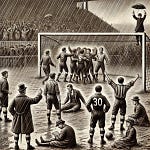Welcome back to "This Day in Scottish History." I’m your host, Colin MacDonald, and today we remember one of the most revered figures in Scottish football, Jock Stein. The date is September 10, 1985, a day etched in both tragedy and triumph. It was on this day, 39 years ago, that Stein tragically passed away, securing Scotland's spot in the 1986 World Cup playoffs but paying the ultimate price in doing so.
Jock Stein, born in Burnbank, Lanarkshire, on October 5, 1922, was a towering figure not just in Scottish football, but across the world. Known for his unparalleled success as the manager of Celtic and the Scottish national team, Stein transformed Celtic into a European powerhouse, winning the prestigious European Cup in 1967—the first British club to achieve such a feat. But today’s episode focuses on the fateful day in Cardiff, when Stein's heart gave out during a World Cup qualifier between Scotland and Wales.
Let’s start with the match itself—one that would become his final act as Scotland’s manager. The stakes were high: a World Cup playoff spot was on the line. The tension at Ninian Park in Cardiff was palpable, with the match tied 1–1 after a late equalizing penalty from Davie Cooper. That draw secured Scotland’s place in the playoffs against Australia, bringing joy to Scots all over. But as the final whistle blew, what should have been a moment of celebration quickly turned into heartbreak. Stein, who had been under immense stress and battling heart issues, collapsed on the touchline. Despite the immediate efforts of medical staff, he passed away at just 62 years of age.
It’s hard to comprehend just how much Stein had already given to the world of football. Let’s take a step back to explore his career. Before managing, Stein was a solid, no-nonsense center-back. He began his playing career with Albion Rovers and later moved to Celtic, where injuries forced him into early retirement. Yet, his footballing journey was only beginning.
Stein took his first managerial role at Dunfermline Athletic in 1960, and it wasn’t long before he made waves by winning the Scottish Cup in 1961. His success caught the attention of other clubs, and after a brief stint at Hibernian, Stein returned to Celtic, where he would cement his legacy. At Celtic, he led the team to nine consecutive league titles from 1966 to 1974, eight Scottish Cups, and six League Cups. But of course, his crowning achievement came in 1967, when his Celtic side, known as the "Lisbon Lions," lifted the European Cup, defeating the mighty Inter Milan.
That historic victory was more than just a win—it symbolized Stein’s footballing philosophy: attacking, free-flowing football. He believed in the beauty of the game, and his teams played with flair and courage, taking on the most defensively rigid teams of the time and triumphing.
By 1978, Stein took on a new challenge as the manager of the Scotland national team. He brought the same belief in attacking football to the national side, guiding them to the 1982 World Cup. Although they didn’t make it beyond the group stage, Scotland's performances were commendable, a testament to Stein's tactical nous and motivational skills.
The journey toward the 1986 World Cup had been fraught with challenges, but Stein, ever the dedicated leader, worked tirelessly. His passion for the game and for his country remained undimmed, even as his health faltered. This drive ultimately led him to that tragic night in Cardiff, where, under immense pressure, his heart gave out, leaving a nation in mourning.
Jock Stein’s death marked the end of an era in Scottish football. His assistant, Alex Ferguson, who would go on to become one of the greatest football managers of all time, took over for Scotland temporarily, leading them to the World Cup in Mexico in 1986. Ferguson would later reflect on the profound influence Stein had on his career and life. It was a loss felt deeply across the footballing world.
Stein’s legacy lives on, not just in Scotland, but globally. Outside Celtic Park today, a statue of Stein holding the European Cup stands proudly, reminding everyone of the man who changed the course of Scottish football. His methods, his philosophy, and his pioneering role as a "tracksuit manager" who was deeply involved in every aspect of the game remain influential to this day.
As we reflect on the events of September 10, 1985, we remember Jock Stein not only for the trophies and accolades but for the way he inspired players, coaches, and fans alike. He was more than just a manager—he was a leader, a visionary, and a hero. His sudden passing was a cruel blow, but his legacy is everlasting. He gave his life to the game, and in his final act, he secured Scotland’s place on the world stage, a fitting tribute to a man who always put football first.
Thank you for joining us on this journey through Scottish football history. Tune in tomorrow for another episode of "This Day in Scottish History." I’m Colin MacDonald, and until next time—Haste Ye Back!












September 10, 1985 - A Day of Tragedy and Triumph